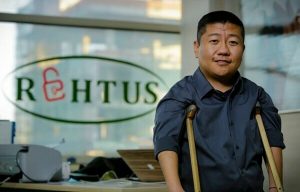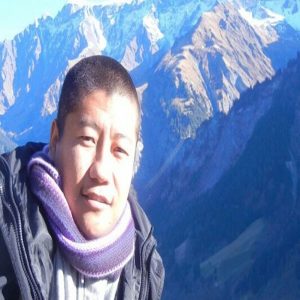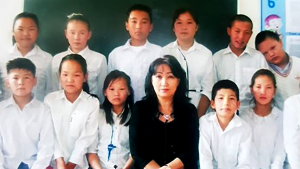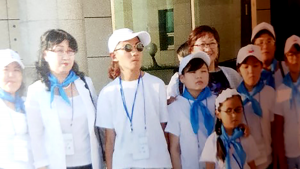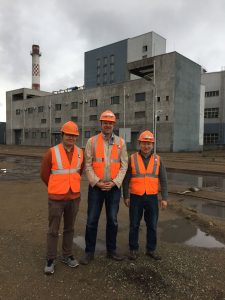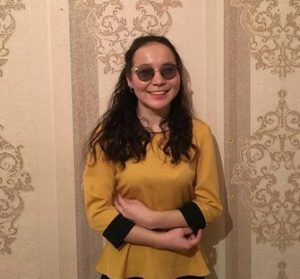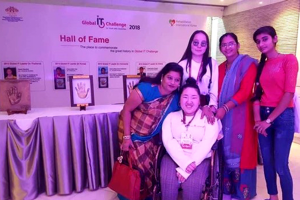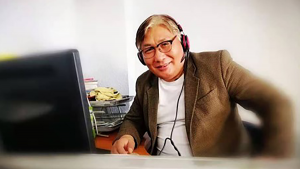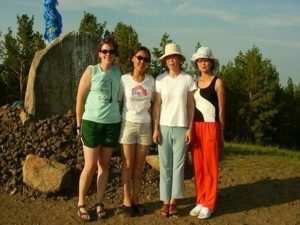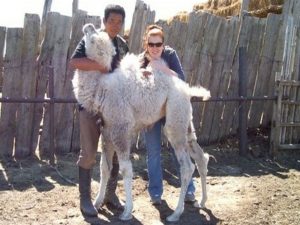By Mendee Jargalsaikhan
Our next guest is from the art world. N. Ligden is a talented musician in the traditional musical band Jonon and in the sessional jazz band Grooving High. Inspired and grown up in a family with musical talents, Ligden is dedicating his life to the musical world despite the challenges of his vision impairment. This was another great podcast that opened up the world of a disabled musician for our listeners.
A Musician is like an Athlete
Ligden’s family encouraged his musical interests and helped in all possible ways. As Ligden recalled, they enlarged the musical notes so that he could read them and learn to play the most difficult tones. If someone has an impairment of one sense, for example vision, other senses could complement the missing skills. So, Ligden explained how his ears have been supporting his musical learning. Ligden graduated from the Mongolian Music and Dance College (now known as the Mongolian State Conservatoire), Mongolian University of Arts and Culture, and the jazz course at Mongolia’s Goethe Musiklabor Ulan Bator. Apparently, the most exciting schooling for him was the jazz course at the Goethe Musiklabor Ulan Bator.
Like many of our guests, he stressed the importance of continued education and urged the people with/without disabilities to pursue education and never give up. For him, musicians are like athletes, especially comparable to runners who are trying to break the record in the 100-meter race. Like the runner, the musician is working so hard to produce a masterpiece and hearing the excitement of the audience is the happiest moment for the musician. His dream is to produce that masterpiece.
Dealing with Stress
For a musician with disabilities there are the difficult, frustrating moments. Whenever Ligden experiences on of those moments, he stops immediately in order to avoid getting anxiety and having an episode of depression. So, he does the things that help him to get some relief and let him forget about that frustrating moment. After two or three days, he tries again with a more relaxed mind and body. Here we asked what advice he would give to disabled people who would like to become artists or musicians. “Don’t be lazy” – Ligden said. “Yes, you are experiencing some type of disability, but you need to find out your specific talents and skills. Nowadays, there are plenty of ways and tools available for your learning. For example, you will find all types of videos or lessons on Youtube. To become a good musician, be open to constructive criticism, this will only make you better.”
Don’t Hide, Be Proud
Ligden wants to change the current attitude towards the people with disabilities. He often feels that people look at disabled people as if they are seeing a ‘rabbit with horns’ (a Mongolian saying). There is some progress, but it’s happening very slowly. For instance, no single bus (public transportation) serves a person in a wheelchair. The only progress regarding public transportation is that some buses are equipped with acoustic and optical announcements of next stops. There are very few sign language interpreters nationwide. If more disabled people were given the opportunity to participate in policymaking, they would contribute to changing the current attitude and lead innovative policies. The country’s development is measured by the level of the inclusiveness of the people with disabilities.
He made two important points: one was not to wait for the state or government to make decisions. Do simple things that anyone can do for the people with disabilities. For instance, if you see a disabled person trying to cross the street, you can extend your help by simply asking if they need assistance. Or, just direct that person in the right direction to cross the street. And talk to a person with a disability as if you were talking to a person without a disability. Ligden’s other advice was for the people with disabilities. If you’re disabled, you don’t need to hide, worry, and be embarrassed about your disability. Please be open minded and express yourself. And get out of the shadow. The more you are present and visible, the more people will understand. Getting out of the shadow is a small thing in comparison to your courage and patience in dealing with the disability. Ligden encourages people with disabilities to be confident.
Impacts of COVID-19
It was scary – as we asked about the impacts of the COVID-19. Just like us, he is living with fear. Because of the restrictions, his sessional jazz band is currently not performing. Also, his band Jonon keeps postponing its recording of the Beatles music, which would be played with traditional Mongolian musical instruments. We all hope things can go back to normal and we all will be able to enjoy listening to a live performance of the Grooving High – in a hidden 🙂 jazz club near the Choijin Monastery or the performance of the Jonon Band.
So, we ended our interview by asking about his dream – which was to produce a lasting musical piece and, his bands appearing on the popular music lists. In this podcast, we really liked Ligden’s appeal to people with disabilities to increase their presence and visibility in order to change the current attitude about the people with disabilities.
The Untold podcast and blog post are made available by the generous support of the Friedrich Ebert Foundation in Mongolia. We also want to thank our editor Riya Tikku.


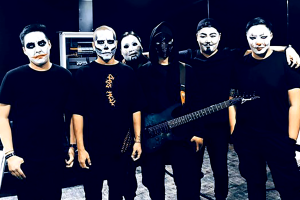
 Follow
Follow